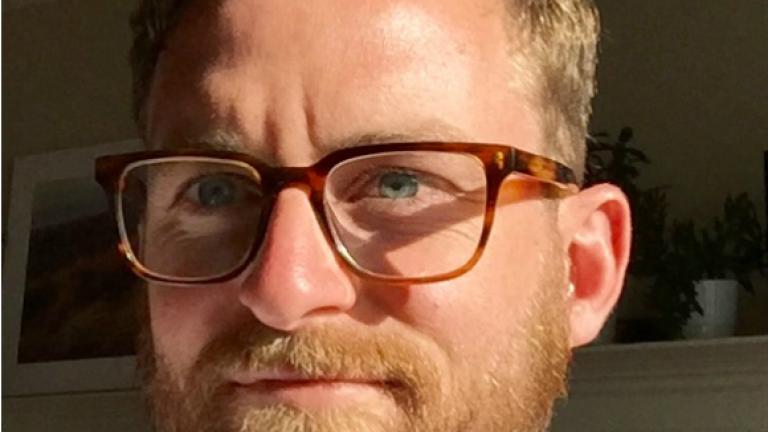Transformative Leadership alum Cynthia Huie, M.A. '24, brings creativity and connection to the San Francisco small-business community.

Alum Chris Restivo's Journey in Somatic Psychology
An interview with a Somatic Psychology graduate Chris Restivo
Trust that, even if you can't see it, you are growing just by showing up.
- Chris Restivo, M.A.-C.P. , Somatic Psychology
What are you doing now? What point are you at in your academic process?
I am an intern at an agency called PREP (Prevention and Recovery in Early Psychosis). We work with transition age youth, 14-30 years old who are in the first five years of their first psychotic episode.
How did you get to the point you are at, process-wise?
In my community mental health class I was encouraged by my professor, Rachel Bryant, to research PREP for my final paper. She knew that I had worked with psychosis previously and thought I would be inspired by PREP's emphasis on early intervention. This opened my eyes to an emerging way of managing and treating psychosis that I did not know about. I had worked [in practicum] with an older adult population with lifelong psychosis, where the focus became more palliative. She wanted me to see the Recovery Model - the overarching approach that most community mental health organizations are now embracing. This paradigm shift reduces the heavy stigma attached to psychotic disorders and brings hope to people living with psychosis. So I did a paper and I set my sights on them, thinking "I'm going to get a job with them." My practicum aided my desirability as a candidate.
Where did you complete your practicum?
My practicum was at the California Pacific Medical Center where I was trained to provide integrative therapy for a mostly older adult population in a skilled nursing facility. We had quite a variety of mental illnesses, symptoms, and some psychosis and used a nontraditional way of delivering therapy. I learned how to be dynamic and custom-tailor each individual encounter in a chaotic, noisy hospital environment.
The experience helped me to break from the frame of "what therapy is." All the books in school and clinical vignettes paint a picture of an upper-middle class, privileged approach to private practice therapy. I was more interested in working with people who had severe and persistent mental illness. I had great supervision that helped me find my strengths and identify my deficits in a supportive environment where I felt okay to be vulnerable. I'm very grateful for my time at the hospital and my supervisors. It was very, very challenging but it helped me to believe in my capacity to handle some very heavy work.
How did CIIS help when launching into practicum?
There were little gems in every class and some classes that were particularly revolutionary in the way that I thought. [In] Anne Krantz' Therapeutic Communication class, the theory of intersubjectivity was totally revolutionary. A lot of Don [Hanlon Johnson]'s work with understanding our place as clinicians in larger society - bringing in the larger context. Mark [Ludwig] always had these little adages that would stay with me, like "As somatic therapists, we are our own toolbox." That is: just by monitoring our own somatic experience, we are already staging a significant intervention. I think everyone is looking for these big flashy somatic interventions where you have the person up off the couch and they are doing some sort of movement and they're having this revolutionary experience - and I think in my experience it doesn't necessarily look like that.
What challenges/fears did you have going into your practicum? How did you deal with/overcome them?
I was worried that I wasn't going to be able to practice psychotherapy in a hospital setting, with people confined to their beds. I was worried that there wouldn't be an opportunity to have a profound outcome or effect on people in those scenarios. I was worried that I was not going to be wise enough. We were dealing with a lot of end of life and grief related issues and also tremendous physical suffering - amputations, liver transplants and just about the most painful stuff that you can imagine. I was worried that I wouldn't be able to help people who were in that level of distress.
I felt oscillations of feeling competent and successful and helpful and then feeling like an utter fake and failure and a total fraud. As far as I can tell that is par for the course with being a therapist. We encounter things that are within our control and that we can work with and then all of a sudden we get a new thing that we are not sure how to deal with, or we're just short on emotional strength at that moment, and we get pushed to our limits. The practicum helped me grow a greater acceptance of myself as therapist and as a human being who is simply going to feel that way sometimes. I also had a supportive cohort at the practicum. I was lucky to land with a group of other interns and trainees that were very much able to lean on each other, and that was crucial.
Do you have any advice for someone who is a step (or a few steps) behind you in the practicum process?
Trust that, even if you can't see it, you are growing just by showing up with your clients. It's all one big learning experience and you are going to be provoked in certain ways and triggered in certain ways. Don't lose track of taking from each experience what is valuable and be careful not to get fixated on the shortcomings. For some reason there's a pull to focus on the parts that are troublesome and in the process we miss all that is valuable.
And lastly, it's not an easy path you chose, so good luck.
Related Academic Program
Master of Arts in Counseling Psychology with a Concentration in Somatic Psychology
Related News
A panel hosted by the Department of Human Sexuality gathered notable alumni from the Ph.D. program to discuss their change-making work and research.
At each CIIS Open House event, a community panel of faculty and alumni discusses what drew them to CIIS and their experiences at the University.



